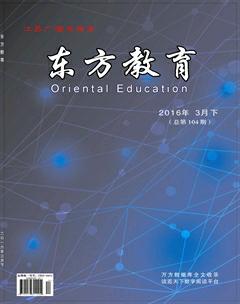On Chinese Mainstream Media Buzzwords
刘秀
Abstract:As a special component of language,media buzzwords are just like a mirror of the age.With the rapid development of mass media,an increasing number of media buzzwords which reflect social trends have been spread out.In an age when cross-cultural communication is an essential means for cultural exchanges,translation of media buzzwords has become a window for foreigners to understand Chinese culture and social changes.This article takes Chinese mainstream media buzzwords from recent years as the research subject,explores its definition,sources,and then sums up the principles of translation,aiming at promoting the transmission of Chinese culture and its exchange with western culture.
Key words:mainstream media;media buzzwords;translation;principles
Introduction
With the rapid development of mass media,a growing number of Chinese new words or phrases have been created on the media,which are called Chinese media buzzwords.As cross-cultural communication develops,buzzwords are widely used by people for the purpose of introducing new things,new ideas and new developments to foreigners,thus enabling them to better understand Chinese culture and the development trends of various fields of the society.The thesis tries to study the translation of Chinese media buzzwords,aiming at promoting the transmission of Chinese culture and its exchange with western culture.
1.The definition of mainstream media buzzwords
In WIKIPDIA(a current encyclopedia),a buzzword is defined as a word or phrase used to impress,or an expression which is fashionable,which are rapidly spread and prevailing among mass media including newspaper,television,radio and the Internet and the audience.2.The causes of mainstream media buzzwords
Since 2002,the Institute of Applied Linguistics of Beijing Language and Culture University has started to make a research about newspaper media.In a certain period with a certain social background,some words are frequently used and some new words are created by the public.There are some major reasons why these words become buzzwords.
1.2.1 Political and economic factors
According to the traditional theory of Journalism and Communication Studies,mainstream media plays the role of a supervisor and a guide and inform people of what is happening around them.Great changes in politics and economics,the implementation of major policies and the significant speeches of national leaders may become the catalytic of mainstream media buzzwords.For example,for the successful convening of the Eighteenth National Congress,a few key words such as "Ecological Civilization"(生态文明),"scientific development"(科学发展)."The Fourth Plenary Session of the 18th CPC Central Committee"(十八大)deliberated on major issues concerning comprehensively advancing "rule of law"(依法治国),"Chinese dream"(中国梦).At the Opening Plenary of the Boao Forum for Asia 2014,Premier Li Keqiang stressed on promoting the important projects of the "One Belt and One Road"(一带一路).
1.2.2 The precipitates of science and technology
With the rapid development of science and technology,a great many of breakthroughs have been made through scientific experiments.For example,the launch of “smart phones”(智能手机),“tablet computers”(平板电脑)and “3-D movies”(3D电影)made the year 2010 so special.Then “Cloud TV”(云电视)officially launched in 2011."Shenzhou 9"(神九),a manned spacecraft flight of China's Shenzhou program,launched in June 2012 and became the first manned spacecraft to dock with the "Tiangong 1"(天宫一号)space station.Chinese deep-sea submersible,Jiaolong(蛟龙号),reached a depth of 7062 meters in 2014."Chang'e 5"(嫦娥五号)which is an unmanned Chinese lunar exploration mission currently under development is expected to land on the Moon by 2017.These are all the embodiment of scientific achievements.
1.2.3The incentive of multiculturalism
With the diversification of social culture,a lot of cultural phenomena appear on TV or the Internet.Mainstream media keep up with the times,reflecting the mentalities of different audiences.For example,the most beautiful driver,teacher,police or even beggar,are all the reflection of "the culture on learning from Leifeng"(雷锋文化)."A Bite of China"(舌尖上的中国)presents us the food culture."The Beijing Spirit"(北京精神)of "patriotism,innovation,inclusion and social morals" manifests the soft power of the capital of "a country with enhanced cultural strength"(文化强国).In recent years,there are more and more different popular "styles come out and become buzzwords and are used in our medium communication.Some “styles” such as “Yuan Fang Style”(元芳体),“Zhen Huan Style”(甄嬛体)are used to express different moods in different conditions.“Taobao Style”(淘宝体)and “Gangnam style”(江南style)were once widespread.“The Voice of China”(中国好声音)and “Chinas Got Talent”(中国达人秀)also received widespread attention.
1.2.4 Other factors
Some mainstream media buzzwords come from our daily life.A series of "copycat" phenomena,such as Shanzhai Lecture Room,Shanzhai Nobel Prize and a lot of Shanzhai pop stars,which was originally triggered by an emulational cellphone made "shanzhai"(山寨)one of mainstream media buzzwords concerning social life.Chinese style road crossing"(中国式过马路)is a satire for Chinese people,which refers to the tendency of large crowds of people to cross roads in disobedience of red lights."Plebs"(屌丝)contrast sharply with " men who are tall,rich and handsome"(高富帅)."Are you happy"(你幸福吗)once inspired people to ponder over what is happiness.
3.The principles for translation of Chinese mainstream media buzzwords
The translators and the theorists have reached a consensus that the translation of any kinds of texts should be close to or similar to that of the source language.No matter what forms of the texts appear in front of the readers,the language of the texts is the most important and fundamental element that no one can avoid.As a result,the translators of Chinese catchwords should lay emphasis on the unity of practice and equivalent theory,and try to keep their functional balance.The effect of translation and the readers' feeling are most important criterion for the translation of Chinese catchwords.Generally,a widely used translation principle of Chinese catchwords should be the equivalent principle on the basis of the equivalent function.
4.Conclusion
Chinese buzzwords show people's values,ideas and states of mind and reflect a period of widespread concern and things in a country or a region.Therefore,the translation of Chinese catchwords becomes more necessary and urgent in international communications.This paper provides us some practical translation methods.If these translation methods are appropriately applied to different occasions,the equivalences on semantic and pragmatic level in catchwords translation can be achieved.
5.Bibliography:
[1]Catford,J.C.1965.A Linguistic Theory of Translation[M].Oxford:Oxford University Press.
[2]Nida,Eugene A.1964.Towards A Science of Translation[M],Leiden:E.I.Brill.
[3]Nida Eugene A.,and Charles R.Taber.2004.The Theory and Practice of Translation[M].Shanghai:Shanghai Foreign Language Education Press.
[4]Cui Yuanlei,Ai Fumei,Gao Jie,2013.Chinese buzzwords draw attention[OL].http://en.people.cn/90782/8462961.html(accessed 06/01/2015)
[5]崔蓬克,2012,当代汉语流行语概念再界定[J]。《当代修辞学》。
[6]李文革,2004,西方翻译理论流派研究[M]。北京:中国社会科学出版社。
[7]廖丽玲,2010,功能对等理论下试译最新网络流行语[J]。《北京城市学院学报》(4):47-53。
[8]吴宝珍,2009,媒体流行语获取研究。硕士学位论文[D]。湖北:华中师范大学。

